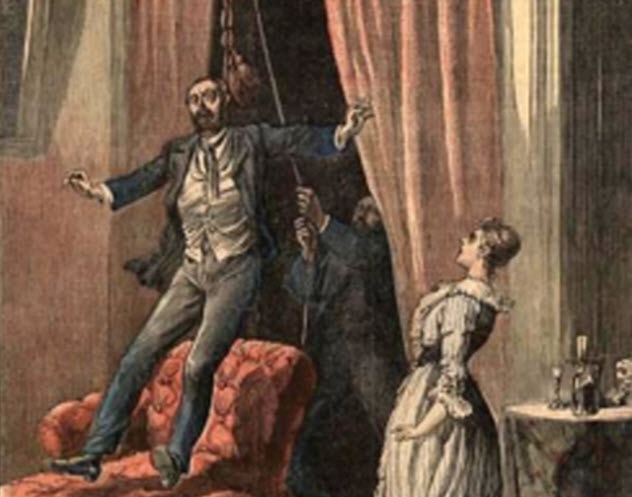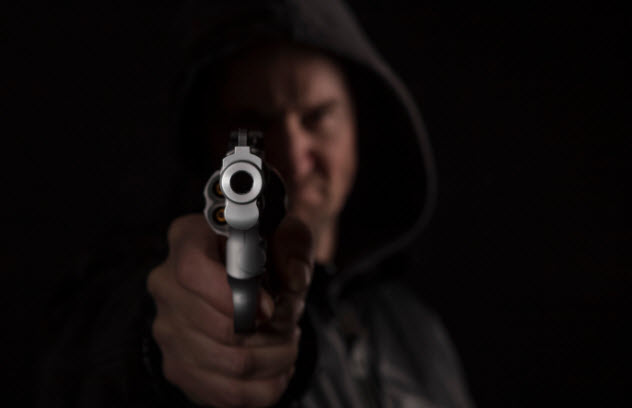 Animals
Animals  Animals
Animals  Gaming
Gaming 10 Game Characters Everyone Hated Playing
 Books
Books 10 Famous Writers Who Were Hypocritical
 Humans
Humans 10 of the World’s Toughest Puzzles Solved in Record Time
 Mysteries
Mysteries 10 Scientific Mysteries We Don’t Fully Understand
 Weird Stuff
Weird Stuff 10 Celebrities Who Have Admitted to Alien Encounters
 Our World
Our World 10 Surprising Secrets of Notre Dame Cathedral
 Miscellaneous
Miscellaneous 10 Intriguing Origins of Popular Carnival Rides
 Weird Stuff
Weird Stuff Ten Unexpected Discoveries Involving Vomit
 Movies and TV
Movies and TV 10 Actors Who Almost Didn’t Take Career-Defining Roles
 Animals
Animals 10 Amazing Animal Tales from the Ancient World
 Gaming
Gaming 10 Game Characters Everyone Hated Playing
 Books
Books 10 Famous Writers Who Were Hypocritical
Who's Behind Listverse?

Jamie Frater
Head Editor
Jamie founded Listverse due to an insatiable desire to share fascinating, obscure, and bizarre facts. He has been a guest speaker on numerous national radio and television stations and is a five time published author.
More About Us Humans
Humans 10 of the World’s Toughest Puzzles Solved in Record Time
 Mysteries
Mysteries 10 Scientific Mysteries We Don’t Fully Understand
 Weird Stuff
Weird Stuff 10 Celebrities Who Have Admitted to Alien Encounters
 Our World
Our World 10 Surprising Secrets of Notre Dame Cathedral
 Miscellaneous
Miscellaneous 10 Intriguing Origins of Popular Carnival Rides
 Weird Stuff
Weird Stuff Ten Unexpected Discoveries Involving Vomit
 Movies and TV
Movies and TV 10 Actors Who Almost Didn’t Take Career-Defining Roles
10 Deadly Cases Of Hypnosis
When a person is hypnotized, he seems to be in a sleeplike state. But his brain is actually more active than usual—except for the precuneus. That part of the brain is deeply involved with the consciousness of the self. It’s not needed when we create imagery that doesn’t include ourselves, which is what hypnosis does.
Sounds harmless, doesn’t it? If hypnosis just turns on our imaginations and makes us less conscious of ourselves, we shouldn’t lose our free will or be in any danger. Yet a series of unusual deaths related to people who were hypnotized suggests otherwise.
10 The Death Of Ella Salamon

On September 17, 1894, a man identified only as “Mr. Neukomm” was visiting 23-year-old clairvoyant Ella Salamon in her uncle’s home in Tuzer, Upper Hungary. Neukomm wanted some medical advice. His brother was spitting up blood, but the doctors weren’t sure if the blood was coming from his stomach or his lungs. So Salamon agreed to be hypnotized by Neukomm in front of her parents and uncle.
Once hypnotized, she started to describe the lungs in great detail. When Neukomm asked if his brother would die, she said, “Be prepared for the worst.” Then Salamon collapsed and mysteriously died minutes later.
At the time, it was believed that her death was caused by a bungled hypnosis performed by a layman, and Salamon’s brain simply couldn’t take the excitement. According to The Journal of the American Medical Association, Salamon was the first person to die while under hypnosis.
9 The Murder Of Thomas Patton

In 1894, wealthy farmer Anderson Gray, who lived near Sumner County, Kansas, was embroiled in a lawsuit. One of the witnesses in the case was his neighbor Thomas Patton. Wanting to permanently silence Patton, Gray went to the living quarters of his farmhand Thomas McDonald on May 5. Gray told McDonald that Patton was spreading rumors about McDonald’s wife, which provoked an argument between McDonald and Patton.
After the argument, McDonald returned home. Gray visited McDonald again and apparently hypnotized him, warning that McDonald had to kill Patton or Patton would kill him first. McDonald tried to protest, but Gray’s hypnotic influence was too strong.
Gray was also able to hypnotize McDonald into having perfect aim with a rifle when he had been a terrible shot before hypnosis. Gray then told McDonald where Patton would be riding in the woods. In a Gray-induced trance, McDonald waited until Patton rode by and then shot him in the heart.
Both Gray and McDonald were arrested. Gray was tried first, found guilty, and sentenced to hang. McDonald, who fully admitted to pulling the trigger, was found not guilty because he was under Gray’s trance.
8 The Death Of Girard Rosenblum

In fall 1952, 21-year-old Girard Rosenblum was studying for his master’s degree at the University of Pennsylvania in Philadelphia. On October 2, his mother walked down to the basement and found him hanging from a joist. His death was immediately ruled a suicide.
A month later, Rosenblum’s death was brought to a coroner’s jury. There, a lawyer for the Rosenblum family presented evidence that the young man’s death wasn’t a suicide but instead a failed attempt at suspended animation through self-hypnosis. According to his mother, Rosenblum had always been fascinated by hypnosis and especially the idea of levitating himself.
The lawyer argued that Rosenblum’s death was an accidental hanging while trying to levitate under hypnosis. The coroner’s jury agreed, ruling that he died “as the result of hypnotic research.”
7 The Death Of Sharron Tabarn

In September 1993, 24-year-old Sharron Tabarn went to see hypnotist Andrew Vincent at a pub in Leyland, Lancashire, England. To wake her from her trance, Vincent told her that she would feel a 10,000-volt electric shock in her seat. She awoke with a shock and left the pub.
On the way home, Tabarn complained that she felt dizzy. Hours later, she choked on her vomit in bed and died. Tabarn was a healthy woman who was two weeks shy of her 25th birthday. She had been drinking that night but not an amount that would cause her to choke on her own vomit. Tabarn’s death was ruled an accident.
Tabarn’s mother blamed the hypnosis show. Her lawyer argued that hypnosis somehow relaxed Tabarn’s gag reflex, which led to her choking. Tabarn’s mother also said that her daughter was terrified of getting electrocuted and that could have contributed to her death. She called for a ban on public hypnosis shows. It was discussed by British ministers, but nothing ever came of it.
6 The Death Of Robert Simpson

On the evening of November 8, 1909, 35-year-old Robert Simpson attended a show by hypnotist “Professor” Arthur Everton in Somerville, New Jersey. Simpson, who was drunk at the time, volunteered to be hypnotized, and Everton put him into a cataleptic state on the stage. Once Simpson was in a trance, Everton showed the large audience that Simpson was definitely out by placing Simpson’s feet on one chair and his head on another. Then Everton stood on Simpson’s stomach.
The problem came when it was time to wake Simpson. He collapsed and lay unresponsive on the floor. Doctors attended to him, but he was dead. At his autopsy, it was revealed that he had died of a ruptured aorta. The doctor also said that Simpson probably had been sick for some time.
Everton was arrested and charged with manslaughter. To earn money for his legal fees, he continued to perform hypnosis shows without further incident. It was believed that Everton would be acquitted because Simpson had probably died of a preexisting heart condition.
5 The Murder Of Jerome Ferreri

On October 26, 1948, 26-year-old Jerome Ferreri brought a young woman back to the palatial home that he shared with his wife Betty Ferreri in Los Angeles, California. Obviously, Betty was not impressed, and she chased the two of them out of the house.
A short time later, Jerome returned and attacked Betty. Charles Fauci, a man who rented a room in the house, got a gun and handed it to the mansion’s handyman, Allan Adron. Fauci told Adron that Jerome was killing Betty.
Hearing Betty’s screams, Adron found the couple fighting in the kitchen. Adron shot Jerome twice before the weapon stopped firing. Then Adron beat Jerome with the gun until Betty snatched it from Adron and tried to fire it. But the gun was still jammed, so she picked up a meat cleaver and whacked her husband on the head 23 times.
Betty Ferreri, Fauci, and Adron were all arrested. Adron confessed to the crime, initially pled guilty to second-degree murder, and even testified as a witness for the prosecution at Betty and Fauci’s trial. However, codefendants Betty and Fauci were acquitted because they testified that Jerome Ferreri was a violent man and Betty was scared for her life.
When Adron went before a judge for sentencing, the court was asked to consider a second plea of not guilty by reason of insanity. Defense psychiatrists argued that Adron wasn’t responsible for the murder because he had been hypnotized into shooting Jerome Ferreri.
According to the psychiatrists, Adron was placed in a trance by the power of suggestion when the gun was put in his hands and he heard Betty’s screams. Supposedly, this caused Adron to shoot Jerome. As a result, Adron was found not guilty by reason of insanity at the time of the murder. However, he didn’t have to go to a psychiatric hospital because he was considered to be sane after the shooting.
4 The Murder Of Augustin Gouffe

In Paris on July 26, 1889, Augustin Gouffe, a successful businessman known for his sexual adventures, bumped into acquaintance Michel Eyraud. Eyraud said that he had broken up with his girlfriend, Gabrielle Bompard, and that she wanted to see Gouffe.
Eagerly, Gouffe made his way to the young girl’s apartment. As Gouffe seduced Bompard, Eyraud slipped a noose around Gouffe’s neck and strangled him. After looting the body, coconspirators Eyraud and Bompard put the body in a trunk and dumped it 500 kilometers (300 mi) away from Paris.
Unfortunately for Eyraud, witnesses had seen him talking to Gouffe before his disappearance. Eyraud became a wanted man but fled before the authorities nabbed him.
On January 22, 1890, Bompard turned herself in, claiming that she was innocent of murder because she had been hypnotized by Eyraud into doing his will. In May 1890, Eyraud was arrested in Cuba and extradited to Paris.
That summer, Bompard and Eyraud went to trial. It was one of the first times that the power of suggestion through hypnosis was used as a defense. The sensational trial made headlines in Europe and America. In the end, Bompard received 20 years in prison, and Eyraud was publicly executed by guillotine on February 4, 1891.
3 The Death Of Marie Colombos

It was 1938, and a pregnant 23-year-old named Marie Colombos was worried about having her baby in the traditional manner. Interested in giving birth under hypnosis, she contacted Robert Gilbert (aka “The Great Gilbert”), a 20-year veteran of vaudeville who specialized in hypnotism. According to local newspapers, Gilbert had just recently helped a woman give birth painlessly through hypnosis. Agreeing to meet with Colombos, Gilbert went to her house in Glendale, California, on June 30 for a practice session.
At some point, the police were called. When they arrived at the house, they found Colombos dead on the couch. Her arms were folded over her chest, and she had a faint smile. Gilbert claimed that he hadn’t done anything to Colombos and that she had simply collapsed on the floor. He said he had placed her onto the couch afterward.
Gilbert was arrested, and an autopsy was performed on Colombos. But no cause of death was found. She was buried, exhumed, and autopsied again. Still, there was no conclusion as to what had killed the expectant mother. Gilbert went to trial and claimed that his hypnosis was not dangerous. Yet he was found guilty and given two to five years in prison. Eventually, his conviction was overturned due to lack of evidence.
2 The Murder Of Hans Wisbom And Kaj Moller

In Copenhagen on March 29, 1951, Palle Wichmann Hardrup, 33, walked into a bank, pulled out a gun, and demanded money. When it wasn’t turned over, he shot bank manager Hans Wisbom and teller Kaj Moller, killing them both.
When Hardrup was arrested, he claimed that the murders and attempted robbery weren’t his fault because he had been hypnotized earlier in prison by his 39-year-old cellmate, Bjorn Schouw Nielsen. Three times a week over a three-month period, Nielsen had supposedly hypnotized Hardrup and run him through the steps of the robbery.
According to Hardrup, Nielsen had instructed Hardrup to ask for the money, and if the teller didn’t comply, he was to shoot that teller and ask the next one. Hardrup even admitted to an earlier robbery where he had turned over all the stolen money to Nielsen.
Nielsen was arrested for planning the robberies and for pushing Hardrup to shoot the two bank employees. After both men were tried, Hardrup was committed to a mental institute, and Nielsen was given life imprisonment. Both were released after 18 years.
1 The Deaths Of Marcus Freeman, Wesley McKinley, And Brittany Palumbo

In spring 2011, North Port High School in North Port, Florida, had a disturbing number of students die in a short time. First was Marcus Freeman, the school’s 16-year-old quarterback, who died in a car accident on March 15. According to his girlfriend, he got a strange look on his face and then drove off the road. Then there was Wesley McKinley, 16, who was found hanged to death outside his home on April 8, 2011. The final victim, 17-year-old Brittany Palumbo, was found hanging in her bedroom closet in May 2011.
The day after Wesley’s death, George Kenney, the school’s principal, told police that these three students were some of the 75 students and staff that he had previously hypnotized. He had taught Marcus how to hypnotize himself so that he could focus better during football. To help Wesley get into the Juilliard School of the Arts, Kenney had hypnotized the young guitar player the day before he hanged himself. Kenney had also hypnotized Brittany to help her with her test anxiety. When her marks didn’t improve after five months, she killed herself.
After being put on administrative leave, Kenney resigned in June 2012. He was given a year’s probation for practicing therapeutic hypnosis without a license. The school board settled with the families of the students, giving each family $200,000.
Robert Grimminck is a Canadian freelance writer. You can friend him on Facebook, follow him on Twitter or Pinterest, and visit his website.








